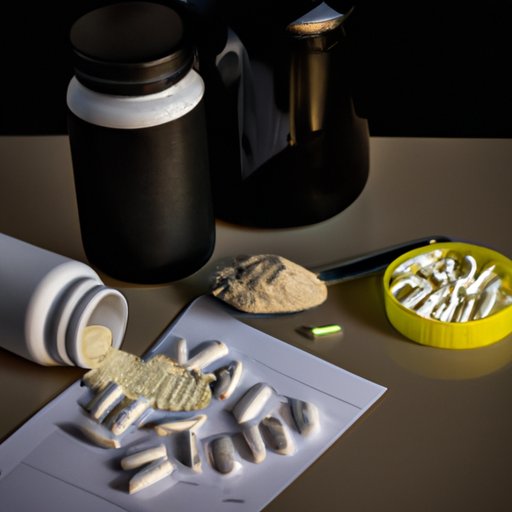Introduction
Are you tired of being skinny and looking to bulk up? Are you interested in building muscle mass for improved health and fitness? If yes, then this article is for you!
Building muscle involves a combination of strength training, proper nutrition, and sufficient rest and recovery. Lifting heavy weights and eating a high-protein diet are two commonly known ways to build muscle mass, but there is more to it than just that. This article will provide a complete guide on how to bulk up naturally.
Incorporate Strength Training
Strength training is the foundation of building muscle. Lifting heavy weights help stimulate muscle fibers and promote muscle growth. Compound exercises are particularly effective in building muscle mass as they work multiple muscle groups at once.
Examples of effective exercises include squats, deadlifts, bench press, and pull-ups. It is important to use proper form and technique to prevent injury and maximize muscle activation. Start with lower weights until you have mastered the technique, then gradually increase to heavier weights.
Increase Caloric Intake
Caloric intake plays a significant role in muscle building. To build muscle, you need to be in a caloric surplus, meaning you need to consume more calories than you burn. The recommended surplus is about 200-500 calories per day.
Protein is essential for muscle growth, and a high-protein diet is recommended to support muscle mass. Aim for around 1 gram of protein per pound of body weight. Good sources of protein include chicken, turkey, fish, eggs, and dairy products. Carbohydrates and fats are also important for muscle growth. Healthy sources of carbohydrates include sweet potatoes, brown rice, and whole-grain bread. Healthy sources of fats include avocados, nuts, and olive oil.
Prioritize Rest and Recovery
Rest and recovery are just as important as exercise and nutrition. During exercise, muscle fibers break down, and during rest, they repair and grow stronger. It is essential to give your body enough time to recover.
Rest days are crucial for muscle recovery. Aim for at least 1-2 rest days per week. Sufficient sleep is also important for muscle repair and growth. Aim for 7-9 hours of sleep per night. Stretching can also help prevent injury and improve mobility. Incorporate stretching into your daily routine to maximize muscle recovery.
Track Progress
Tracking your workouts and diet is essential for measuring progress and identifying areas for improvement. There are many methods for tracking progress, including online apps and paper logs.
Use progress tracking to adjust your workout and diet plans accordingly. If you are not seeing any progress, it may be time to switch up your routine or adjust your diet. Seeing progress can also help motivate and encourage you to continue your muscle-building journey.
Apply Progressive Overload
Progressive overload is the gradual increase in weight, reps, or sets over time. It is a fundamental principle of building muscle. Increasing the workload on your muscles is essential for continued progress and preventing plateauing.
Add weight to your lifts gradually or increase the number of reps or sets you perform. Varying your exercises and changing your workout routine can also help apply progressive overload.
Supplement Wisely
Supplements can complement your diet and support muscle growth. Creatine and protein powder are two supplements that have been shown to increase muscle mass, strength, and endurance. However, supplements should not replace proper nutrition.
Choose supplements that are safe and effective. Do your research before taking any supplements. Consult a doctor or nutritionist if necessary.
Stay Consistent
Consistency is key to building muscle. It takes time and effort to see results. Set achievable goals and stick to a routine. Find a workout buddy or hire a personal trainer for added motivation and support.
Avoid burnout by incorporating rest days and varying your workouts. Balancing your muscle-building routine with other activities and hobbies can also improve overall well-being.
Conclusion
Building muscle naturally requires a combination of strength training, proper nutrition, rest and recovery, tracking progress, applying progressive overload, supplementing wisely, and staying consistent. It takes time and effort, but the results are worth it. Start your muscle-building journey today and prioritize your health and fitness.
